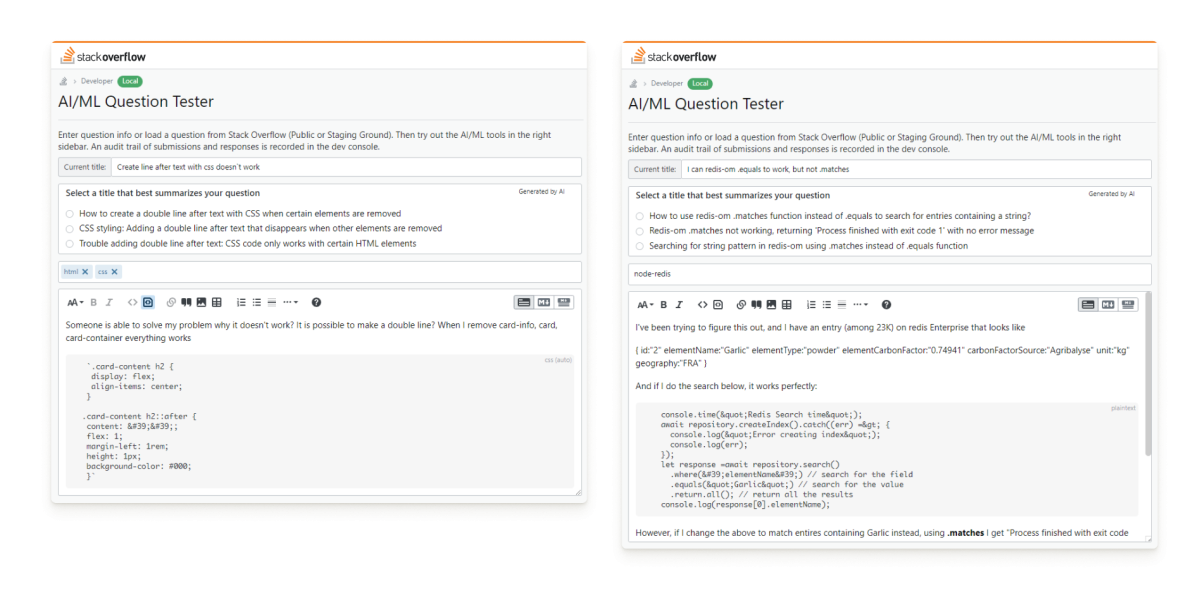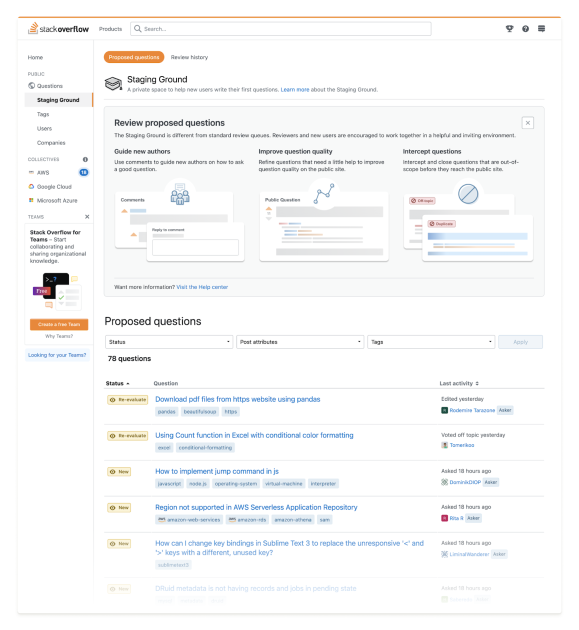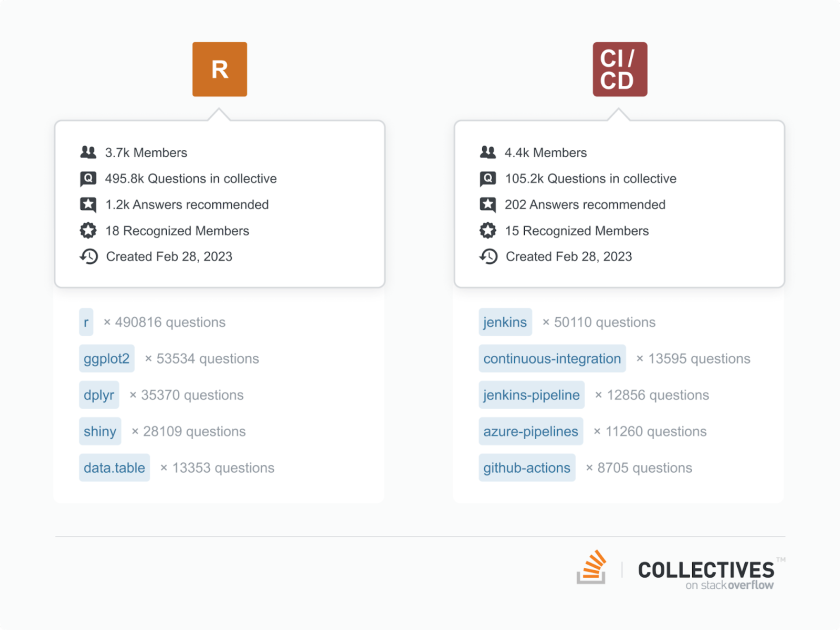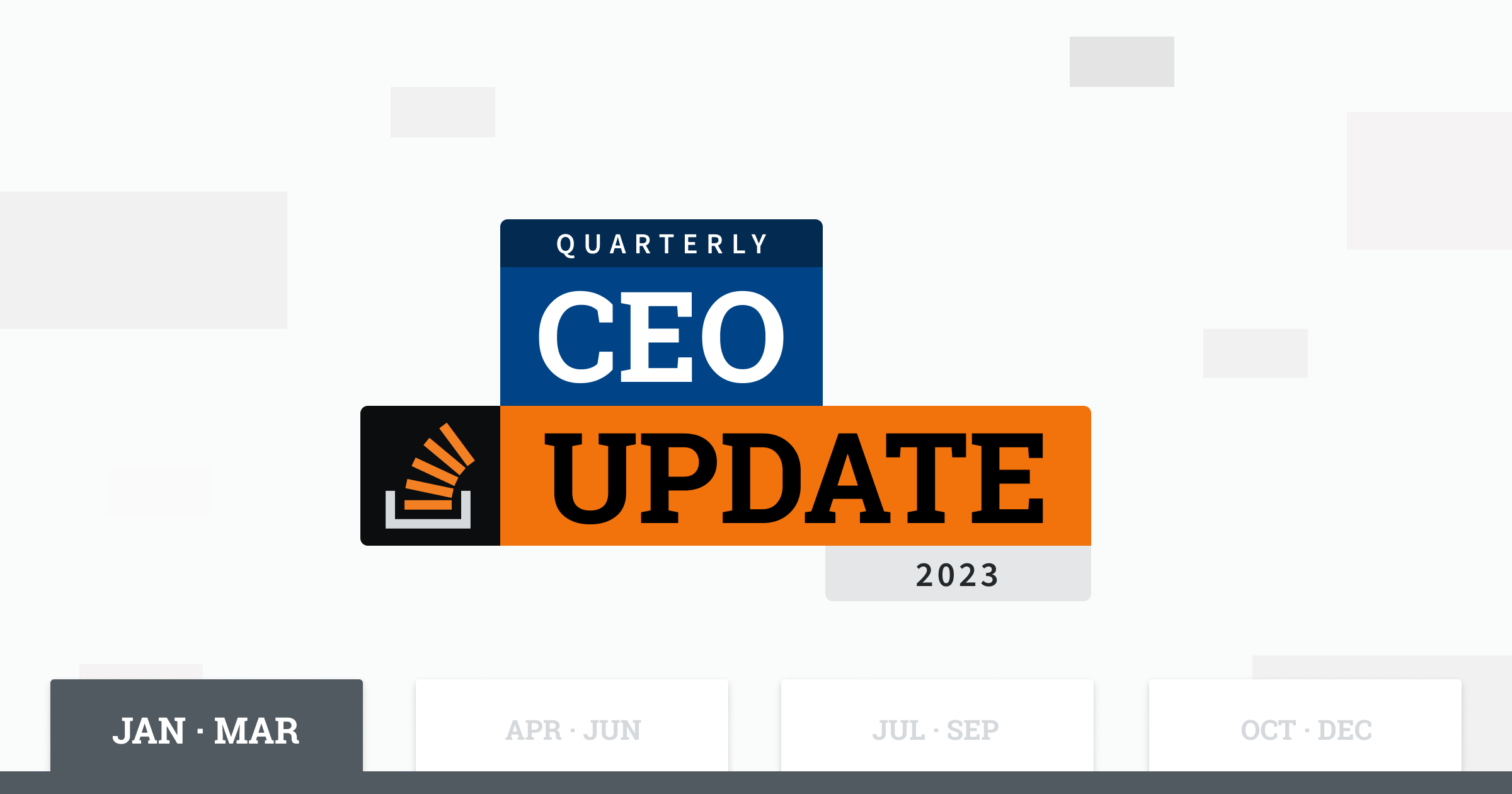Since my last quarterly update, companies across nearly every sector have experienced significant transformation—whether it’s a more aggressive focus on profitability or a shift in product strategy due to the acceleration of generative AI (GenAI). Thematically, however, one thing has remained the same: companies are committed to driving productivity and efficiency throughout their organizations. At Stack Overflow, we continue to help our customers and community deliver both.
In the last quarter of our fiscal year, which ended on March 31, that meant announcing the availability of Stack Overflow for Teams in the Microsoft Azure marketplace while launching Topic Collectives and Staging Ground Beta 2 on our public platform. But most significantly, we accelerated our AI efforts internally and look forward to sharing more this summer. I’m excited to see how we leverage our domain focus and special community-driven blend of trust, recognition, and accuracy to GenAI.
Profitable growth is the new mantra
Stack Overflow, and Stack Overflow for Teams, in particular, is well-suited to the industry-wide shift from “growth-at-all-costs” to profitable, sustainable expansion I mention above.
We continue to evolve as an organization, focusing on a path to profitability in addition to navigating a dynamic external market. Part of this evolution led us to make the difficult decision to reduce our headcount by 10% last month. Through these changes, I remain grateful for our community, which is the basis of everything we do, and for the many Stackers who demonstrate great resilience and live our mission and values each day.
Every organization is incentivized to add new products and revenue streams using incremental capital. This is a rational approach when top line growth is all that matters and additional investment is widely available. However, in the new world of profitable growth, incremental resources are no longer cheap and accessible. As a result, productivity and efficiency are critical. To continue growing, every company needs to do more with the resources it has, and every employee (not just those in Sales) must understand that their actions impact revenue.
This is especially important for developers. Often, a new feature or product is the difference between closing a new customer/growing an existing one and seeing deals slip to the next quarter or fall out of the pipeline entirely. In fact, research from McKinsey shows that companies who innovate through crises not only outperform the market by 10% during the crisis but also realize a 30% average long-term gain.
A company whose innovation strategy I’ve long admired is NI (National Instruments). The company has been developing cutting edge technologies and products since it was founded in the mid 1970s. Today, given the pace of change, that means taking a technology they’ve been developing for a number of years and bringing it to a new tech stack—whether third party or open source—to enable their product development goals.
Since the company adopted Stack Overflow for Teams, as showcased in the video case study below, technologists within NI spend less time waiting for answers and guidance and now have a channel for the “cultural value of collaboration.”
“They are creating this culture on Stack Overflow where it's become a really safe place to ask a question, a safe place to provide an answer, and try to get people closer to their solution, and I think that's part of what's made it really successful and where we found a lot of value.”
In a dynamic world, innovation is a powerful way to grow, yet it has to happen via an increase in productivity, not an increase in spending overall. That makes Stack Overflow for Teams a critical tool for all organizations; we know it accelerates innovation by increasing developer productivity and overall engineering capacity.
Looking forward to growth and the impact of community on AI

When I think about Stack Overflow’s future, what makes me most excited is how we are innovating, and that’s largely based around the work that we’re doing to incorporate GenAI into our products.
Part of innovation is exposure to how things could be done differently. If there’s no exposure to how it could be done differently, there’s no learning/experiencing alternative techniques, there’s no innovation. As with the rise of remote and hybrid work at the beginning of the pandemic, those companies who embrace opportunities to leverage generative AI and automation in their everyday work flows in intentional ways that assist the productivity of their workers will be the most successful in this next phase of the modern workplace. Our vision for community and AI coming together means the rise of GenAI is a big opportunity for Stack. Approximately 10% of our company is working on features and applications leveraging GenAI that have the potential to increase engagement within our public community and add value to customers of our SaaS product, Stack Overflow for Teams. We believe that the developer community can play a crucial role in how AI accelerates, ultimately helping with the quality coming out of GenAI offerings—and in that, further improving the modern workplace as we know it.
Stack Overflow for Teams is uniquely positioned for this moment. But beyond this clear value prop, what really sets us apart is the strength of the community. The community is often our biggest champion in the enterprise; its members want to use a tool they know and trust to manage their proprietary information and collaborate with peers who are likely familiar with Stack Overflow as well. Community is our competitive advantage and a key reason we remain insulated from the worst of the business cycle’s ups-and-downs.
We believe GenAI can be a similar competitive advantage for Stack Overflow. We have the domain focus and community trust to responsibly deploy generative AI to improve our existing suite of products and lead to new solutions and revenue streams. An example of where we have already begin to experiment in order to improve the platform is our generative AI tool to suggest better question titles. As our VP of Community points out, the this tool serves three purposes. First, question askers spend less time crafting the perfect title for their questions, and instead can focus on the content of the question. Second, question reviewers are able to better understand the content of the question, making it easier to suggest edits or improve the post. Finally, end users of Stack Overflow can more easily understand if the question is relevant to their needs. This tool is one of many that we are launching in coming weeks.
Our community has given us feedback through the evolution of this tool, and their feedback is critical to how it scales. As the AI landscape continues to evolve, the need for communities that can nurture, inform, and challenge these technologies becomes paramount. These platforms will not only offer the necessary guidance to refine AI algorithms and models but also serve as a space for healthy debate and exchange of ideas, fostering the spirit of innovation and pushing the boundaries of what AI can accomplish.
We want to be able to continue to invest back into our community, and that's why we're also exploring what data monetization looks like in the future. LLMs are trained off Stack Overflow data, which our massive community has contributed to for nearly 15 years. We should be compensated for that data so we can continue to invest back in our community. This also boils down to proper attribution. Our data represents significant effort and hard work stored across our site and LLMs are taking those insights and not attributing to the source of that knowledge. This is about protecting the interest in the content that our users have created as much as it is the fight for data quality and AI advancement.
Our thesis on community as the center of a safe, productive, and open future for AI also offers some exciting prospects for our business. Stack Overflow for Teams, our enterprise, private version of Stack Overflow, helps to power a community-driven knowledge base inside of 15K+ organizations like Box, Microsoft, and Liberty Mutual. Decades of institutional knowledge, shaped and curated by subject matter experts and experienced teams, allows the employees at these organizations to more easily collaborate, improving productivity and trust.
There is no doubt that code will be created more quickly and the volume is likely to explode with code completion tools and the need for trust will increase. Stack Overflow for Teams is essential for keeping up with the pace of change. It allows SMEs to review complex code, warn of risks and cascade and ensure adherence to company standards and policies. With the community as our foundation, Stack Overflow for Teams as our growth engine, and GenAI as our accelerator of the future, we are well-positioned to grow no matter the environment around us.
Stack Overflow for Teams now available in the Microsoft Azure Marketplace
Despite our focus on the future, we accomplished a lot over the last several months. High on that list of accomplishments is our partnership with Microsoft, which is making our SaaS solution more easily accessible than ever before. The addition of Stack Overflow for Teams in the Azure Marketplace is the latest expansion of our relationship with Microsoft and follows the launch of the Microsoft Azure Collective on Stack Overflow.
With Stack Overflow for Teams in the Azure Marketplace, Stack Overflow customers can now take advantage of the scalability, high availability, and security of Azure while streamlining deployment and management. That means developers and technologists can access the institutional knowledge they need while having the ability and digital space to collaborate and build innovative features quickly—rather than wasting countless hours searching for an answer to or expert on a problem that was seconds away from their fingertips.
After the launch of the Azure Collective on Stack Overflow and the existing integration between Microsoft Teams and Stack Overflow for Teams, our availability in the Azure Marketplace was an exciting and logical next step.
Staging Ground Beta 2 and finding your sub-community

In addition to making it easier for customers to deploy Stack Overflow for Teams, we’re also working to make it easier for individuals to join the Stack Overflow community and find their place within it.
Staging Ground is a key part of this effort, and I discussed it briefly in my last blog post. Since then, this new public platform feature, which allows new askers to receive guidance from more experienced community members before posting their first questions publicly, has completed Beta 1 and entered Beta 2.
Beta 2 expands on the success of Beta 1 with a wider release, comment templates and guidelines for reviewers, and a new UI, among other improvements. We hope to confirm our findings from Beta 1, which found—among other things—that questions approved in Staging Ground had an 85% greater success rate than their non-Staging Ground counterparts.
Perhaps most importantly, we hope that Staging Ground can help us welcome and grow the next-generation of technologists by exposing them to mentorship from more experienced users and moderators. One community member summed up our ambitions nicely when they said, “I found it surprisingly satisfying to help a new asker learn how to turn a poorly-asked question into a well-asked one.”
I’m excited for Staging Ground Beta 2 to continue our progress making it simple and efficient to access the wealth of knowledge and experience the Stack Overflow community contains.
The launch of Topic Collectives: R and CI/CD

Topic Collectives also seek to make knowledge and expertise more easily accessible. They build on the success of Company Collectives and have a similar goal: to serve as a dedicated space where developers and technologists can find content organized around a specific area of interest.
In my January post, I highlighted Collectives for each of the big three cloud providers—AWS, Microsoft Azure, and Google Cloud. Now, I’m excited to announce our first two Topic Collectives: R and CI/CD. As we expand the number of Collectives on Stack Overflow, our belief is they will serve as a vehicle through which every member of the larger community can find smaller sub-communities best suited to their needs and interests.
A healthy community is essential to our company mission and higher purpose of empowering the world to develop technology through collective knowledge. We will never lose sight of how important, impactful, and unique it is. The trust of our community is as essential as the trust in the data it produces. Whether it is the shared passion for a given topic or the shared knowledge of a given specialty, Stack Overflow remains a destination for developers and technologists to solve problems. The problems we solved back in 2008 are not the ones we solve in 2023. Our evolution in offerings is what keeps our users coming back—and keeps us a go-to resource. I continue to be excited about our future and what we’ll share with you in the coming months. Until then, I continue to be thankful for our customers and community members that help us in our mission to empower the world to develop technology through collective knowledge.
